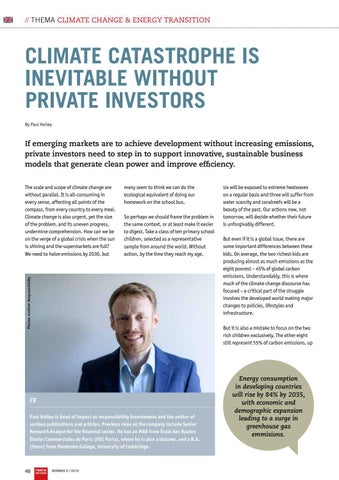// THEMA CLIMATE CHANGE & ENERGY TRANSITION
CLIMATE CATASTROPHE IS INEVITABLE WITHOUT PRIVATE INVESTORS By Paul Hailey
If emerging markets are to achieve development without increasing emissions, private investors need to step in to support innovative, sustainable business models that generate clean power and improve efficiency. many seem to think we can do the ecological equivalent of doing our homework on the school bus. So perhaps we should frame the problem in the same context, or at least make it easier to digest. Take a class of ten primary school children, selected as a representative sample from around the world. Without action, by the time they reach my age,
Photos: Archive ResponsAbility
The scale and scope of climate change are without parallel. It is all-consuming in every sense, affecting all points of the compass, from every country to every meal. Climate change is also urgent, yet the size of the problem, and its uneven progress, undermine comprehension. How can we be on the verge of a global crisis when the sun is shining and the supermarkets are full? We need to halve emissions by 2030, but
But even if it is a global issue, there are some important differences between these kids. On average, the two richest kids are producing almost as much emissions as the eight poorest – 45% of global carbon emissions. Understandably, this is where much of the climate change discourse has focused – a critical part of the struggle involves the developed world making major changes to policies, lifestyles and infrastructure. But it is also a mistake to focus on the two rich children exclusively. The other eight still represent 55% of carbon emissions, up
CV Paul Hailey is Head of Impact at responsAbility Investments and the author of various publications and articles. Previous roles at the company include Senior Research Analyst for the financial sector. He has an MBA from École des Hautes Études Commerciales de Paris (HEC Paris), where he is also a lecturer, and a B.A. (Hons) from Pembroke College, University of Cambridge.
46
six will be exposed to extreme heatwaves on a regular basis and three will suffer from water scarcity and coralreefs will be a beauty of the past. Our actions now, not tomorrow, will decide whether their future is unforgivably different.
FINANCIAL INVESTIGATOR
NUMMER 6 / 2019
Energy consumption in developing countries will rise by 84% by 2035, with economic and demographic expansion leading to a surge in greenhouse gas emmisions.
























